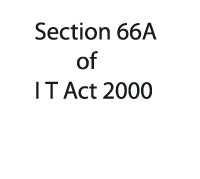On Thursday, a Supreme Court bench of Justices J Chelameswar and Rohinton F. Nariman reserved the verdict in a slew of petitions filed against the validity of several provisions of cyber law, with particular emphasis on the controversial section 66A of the Information Technology Act, 2000. Section 66A provides for the arrest of a person for allegedly ‘offensive’ substance on the internet.
The government concluded its arguments, submitting that section 66A of the Act cannot be deemed unconstitutional merely on the pretext of potential or isolated cases of ‘abuse’ of the said provision. Additional Solicitor General, Tushar Mehta had argued that the enactment or implementation of section 66A does not necessarily mean that the government is in favour of curbing the freedom of speech and expression provided to the citizens of India under its Constitution. However, he preached caution in pleading for unregulated and unmonitored use of the internet.
Further, the bench observed that the use of words and phrases like ‘illegal’, ‘grossly offensive’ and ‘menacing character’ are at best vague in nature and might very well be capable of being misunderstood, resulting in abuse of the provision.
Earlier, the Court referred to various judgments, which had been quoted by the Additional Solicitor General in support of his submissions. The ASF had cited these rulings of a variety of English Courts, on the use of terminologies such as ‘grossly offensive’. The crux of these judgments hit the nail on its head according to the ASG, by arguing that the same set of facts are open to a variety and difference of perceptions and as such there is no guarantee that the said phrase cannot be misused or abused. Further, the ASG stated that it is almost next to impossible to even venture to define these inherently subjective terms. Several provisions of the Indian Penal Code also suffer from the same malaise, for e.g the term ‘outraging the modesty of a woman’ which has been interpreted in numerous different ways by numerous different Courts.
Initially, Tushar Mehta set the tone for further arguments, by submitting various case laws and practices prevalent in the country, to mitigate and regulate content deemed ‘offensive’ in nature; content related to website and other online public media available. He observed that even social networking websites like Facebook have taken recourse too grievance redress mechanisms for monitoring and addressing complaints relating to ‘offensive’ substance floating around on the respective websites.
Further, Additional Solicitor General P.S. Narsimha, appearing on behalf of the Kerela Government pointed that with the passage of time Art. 19(2) of the Constitution which provides for restrictions on the freedom of speech and expression needs to be construed in the same dynamic and progressive manner, in which Art. 19(1) has been interpreted, in order to catch up with the changing dimensions and contexts of free speech and online communication both public and private. The Central Government, through Additional Solicitor General Mehta addressed the court on the imminent need for regulating an essentially independent social communication medium, in the absence of a formal institutional regulator.
The Court has been hearing several petitions filed challenging the validity of section 66A of the Information and Technology Act, 2000 which empowers the police to arrest any person for posting ‘offensive’ content online. The first PIL in the matter was filed by ShreyaSinghal (a law student) who prayed for amendment in the impugned section. The case was filed in the backdrop of two girls- ShaheenDhada and RinuShrinivasan, being arrested in Palghar for posting content against the ‘bundh’ called by the Shiv Shena post the death its supreme leader, Bal Thackeray.
by Siddhartha Singh.

